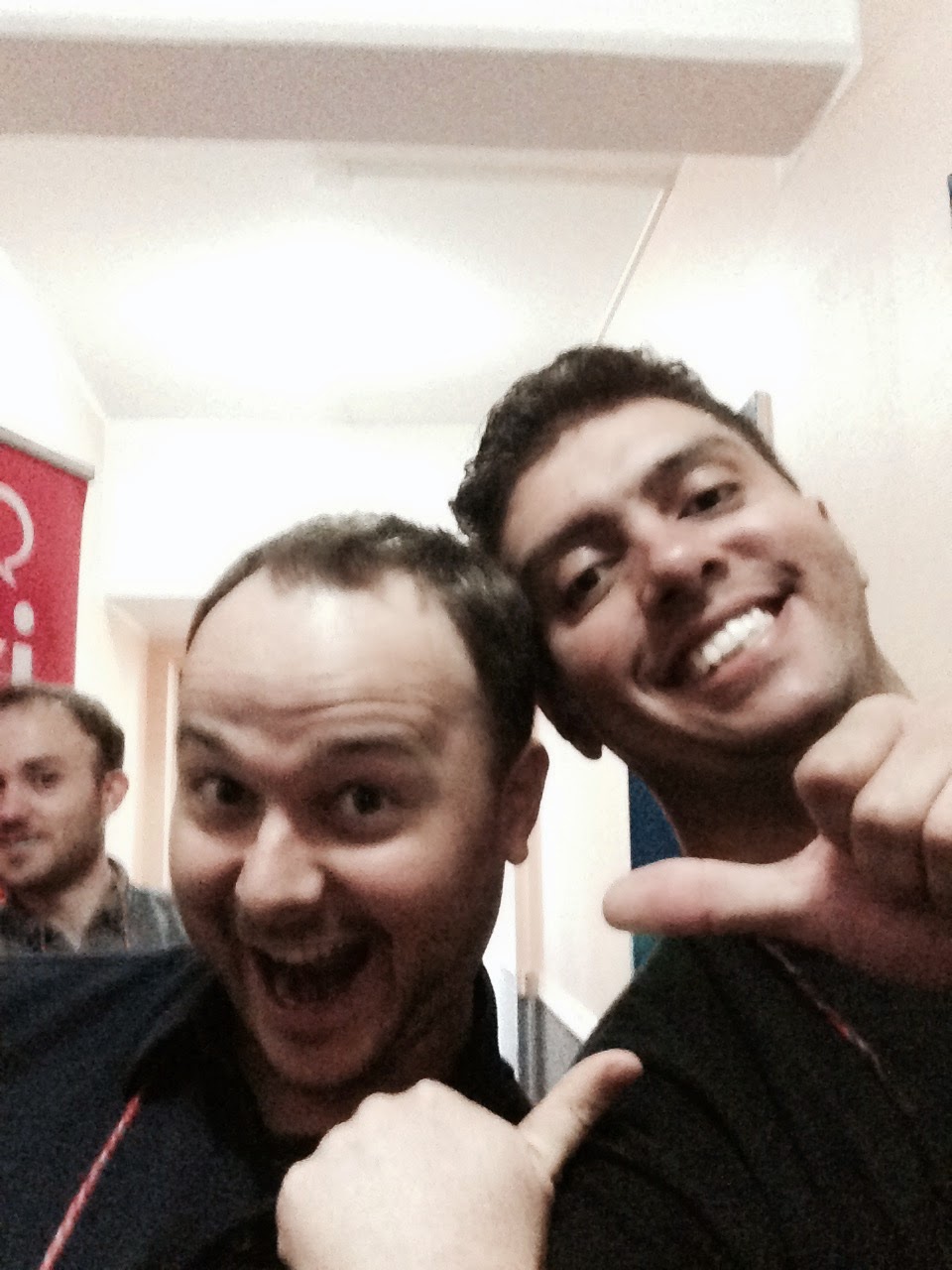Notes on Russian Neo, which will teach you how to crack the language matrix and taste the language for taste and color. Expensive.
Unlike a number of imitators (including the Ukrainian swindler of Crimean Tatar origin Aishe Borseitova deserved special attention), the Russian Dmitry Petrov
- popular psycholinguist;
- unique polyglot;
- the author of the same unique as himself, a method of learning any language in an extremely short time.
The purpose of this article is to refute these three theses and put forward a number of assumptions arising from the actions of the “methodist”, including that Dmitry Petrov is an incompetent specialist in matters that he is regularly asked to speak about in the media, a liar and a charlatan, thanks to his acquaintances and misleading, who has become a TV presenter in order to create a media image for himself of an expert in linguistics, who knows almost all the languages \u200b\u200bknown to mankind, with the aim of further commercializing it and attracting the general population to their paid courses in English and other languages using his own “method” (with this without conducting classes there in person). As you can see already from the introduction, I do not hide my attitude towards the hero, however, all the facts that I cite are generally known or can be independently verified. The words "method"
Way to success
You can learn about the main facts of Petrov's biography from a number of interviews and on the Wikipedia page dedicated to him . However, our discussion is related to his profile education and professional path, because this information can be verified from relatively independent sources, which cannot be said about Petrov’s own stories about childhood, in which, according to his own statements, at the end of school he freely read books in English, German, French and Italian. In light of the outright, verifiable lies, examples of which are given below, this information should also be taken extremely critically.
1975 . Petrov enters the group of English (primary) and French (second) languages at the translation department of the Moscow State Pedagogical Institute of Foreign Languages. Maurice Thorez (MGPIIYA) (now the Moscow State Linguistic University [MSLU], which is going through hard times), which gives reason to believe that he graduated in 1980. As noted in a laudatory review of his comrade by Petrov's classmate, and now deputy head of the Federal Press Agency of the Russian Federation Vladimir Grigoryev , Petrov, even as a student, was distinguished by "God's chosen people": he could drink for weeks, while mysteriously remaining the best student in the group :
There are people who are simply talented, extremely talented, and there are God's chosen people. The last one is about Petrov. Everything that Dima does, without even putting any visible effort into it, he does better than others.
<…>. I could spend weeks in a pub (we were all on the verge of dropping out of the Komsomol and from the institute, and this is the easiest wording that describes our lifestyle at that time) - and be the best student in the best group of the institute. Once he learned Hungarian for a bet in two weeks. In a very simple way: he read in Hungarian the book "Three Men in a Boat, Not Counting the Dog", known to him from the English original. In approximately the same way, he learned Yiddish, Hebrew, Hindi and Urdu, and German, English, French, Slovak, Macedonian and others were certainly very easy for him.
Let us add that if he really studied these languages "approximately the same", then the result was probably obtained approximately the same - zero or close to it. I also draw your attention to the fact that the theme of active, intensified, indefatigable alcohol consumption runs like a red thread through almost all of Petrov’s interviews or stories about him, which for his devoted fans rather serves as an additional reason to admire their idol and rejoice: it turns out, even to him, "God's chosen" connoisseur of a myriad of languages, nothing human is alien.
Immediately after graduating from the university or a little later, Petrov begins to teach there, taking advantage of his acquaintance with his senior translator Dmitry Yermolovich for several years - also a graduate and (until recently) a foreign language teacher, who introduces Petrov to the head of the corresponding department (Yermolovich himself recalls this in a note about your friend). The ability to skillfully use connections and acquaintances at the right time is a skill that Petrov will need more than once.
2000s, Russian-Kazakhstan center of mystical practices "Shakti", group "Free mystics". Petrov, called by his fellow mystics one of the “people who open the world to us”, participates in this team as a trainer and host of programs in “psycholinguistics”, which means “the magic of sound, sign, word, training of irrational perception and psychophysical resonance , psychophysical resonance training, quantum linguistics” (only training is missing to establish contact with an entity in the form of a gnome , which is an obvious omission).
This is how a typical pastime of “free mystics” looks like, among which Petrov is listed:

About Petrov himself in a note with a poetic title “ And the hot sacrificial fire danced in the darkness like a scarlet horse!” ” it is said like this [emphasis in bold is mine - D.P.] :
“Dmitry Petrov from Moscow is a mystical, enigmatic personality . Speaks 120 languages ! Extra-class translator, can simultaneously translate in 10-12 languages . …brought the program […] “Nordic Tantra” to the festival. He came out to the people with a guitar and a song and, like a skald, in a poetic form he told how to interact with the gods and how to interact with each other.
Below are a few photographs of the mystical Petrov of that period:
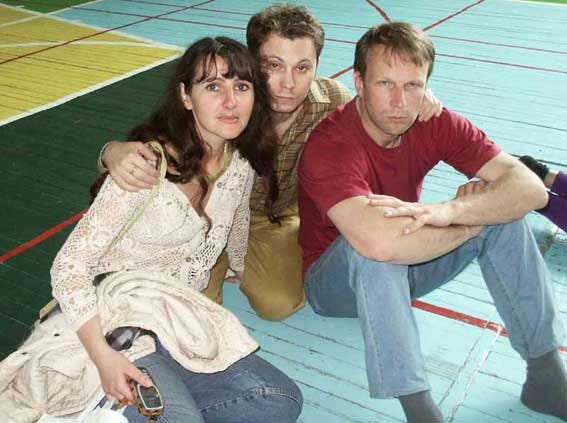
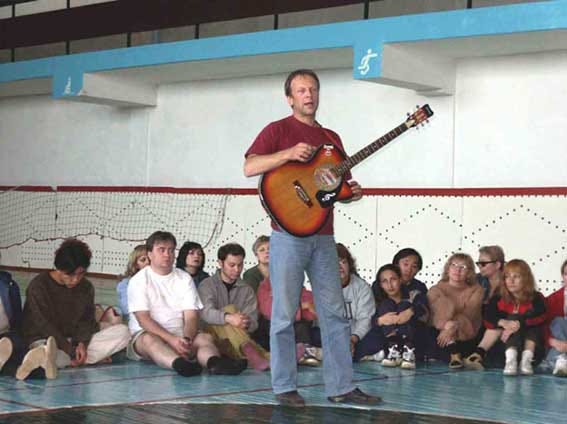
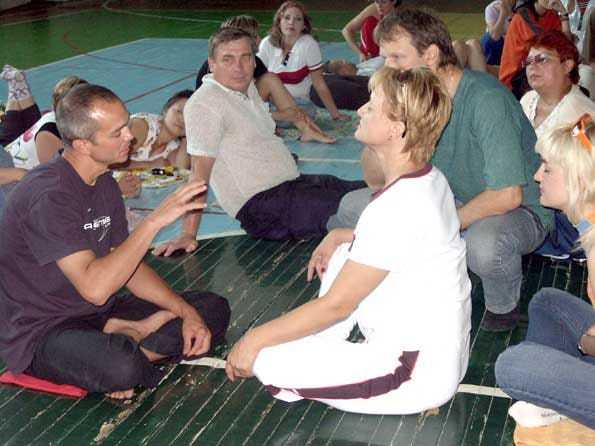
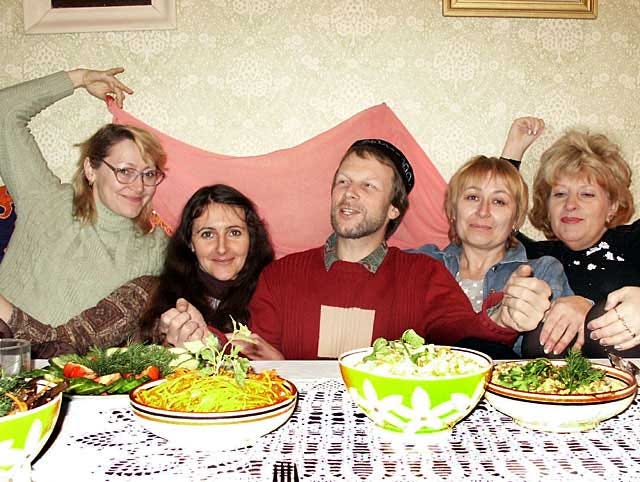
2000, TV show "Anthropology" by Dmitry Dibrov on the NTV channel . The first appearance of Petrov on television, which was found. In the preface, Dibrov notes that fate has periodically brought him to Petrov for 15 years now - ever since Petrov taught English for TASS employees, where Dibrov worked in 1985, and introduces the guest as a psycholinguist (Petrov at the same time modestly blunts his eyes ).
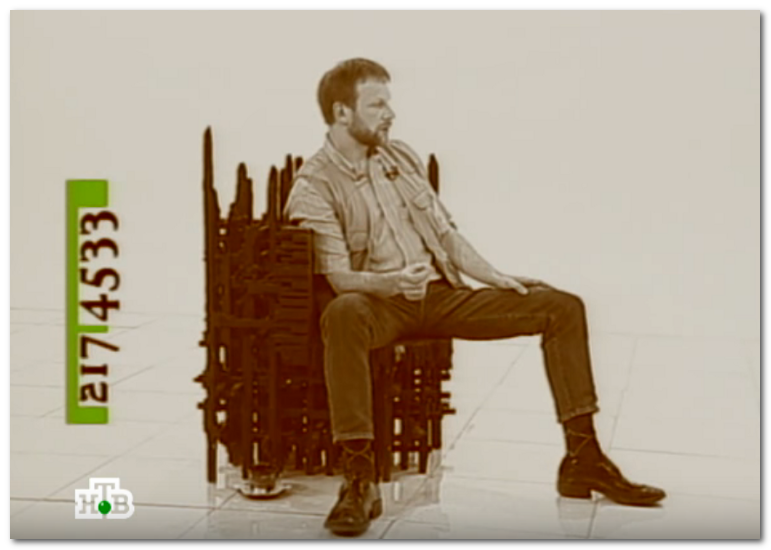
The air almost entirely consists of Petrov’s superficial and incoherent reasoning, sometimes from calls from viewers that are not convenient for him and Dibrov’s specific questions, very often from lies and information “ducks” heard somewhere (see below) and incessant references to numerous advantages some "method" that Petrov uses to work with students. Dibrov, pointing to the pager where messages from the viewers come, ends the program with the words: “ Everyone wants to get on Petrov’s courses, everyone wants to read his book. I can’t do this, I can’t, because it will immediately take on an advertising character ” (of course, Dibrov does not say that all the previous 45 minutes were an actual advertisement for his guest, from which the audience learned about the courses).
2010 . Petrov, together with his friend Vadim Boreyko (the former editor-in-chief of the Forbes-Kazakhstan online publication, who was fired from there at the end of 2015 and who, without undue modesty, calls himself a "class specialist" and "legendary journalist"), writes the book "Magic of the Word " . According to some reports, the book was completely written by Boreyko, acting as a kind of biographer and literary negro of Petrov.
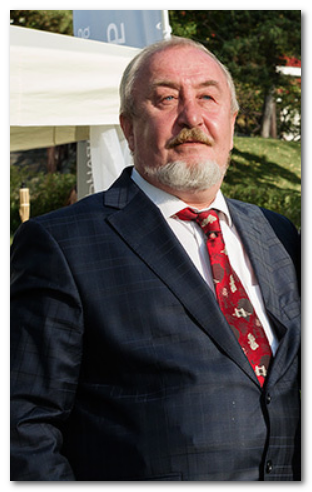
The annotation of the book says: “... one of the authors of this book, philologist, translator, creator of a unique psycholinguistic method of accelerated learning of foreign languages, Dmitry Petrov. <…> Boreiko was convinced from personal experience how Petrov’s technique works…”. In the preface to the book, a certain writer Igor Svinarenko writes about the authors: "They are bright people, seasoned engineers of human souls, finished intellectuals, brilliant drinking buddies." Further, Svinarenko cites an interesting fact of Petrov's biography: "Petrov ... promoted new linguistic methods in Kazakhstan ( according to rumors, he dissuaded the Kazakhs from switching to the Latin alphabet ... )". The book as a whole provides an element of advertising the “method”, which is not particularly hidden in the preface: “... this chapter- the most valuable in the book now "[meaning the chapter in which it is described how Boreiko, using the" method ", under the mentorship of Petrov, in 4 days (!) "learned Italian". - My note - D.P. ].
September 2010 . Petrov is one of the speakers at the local TEDxPerm conference (respectively, in Perm) with a speech on the topic “The Language of the Universe, the Language of Humanity”. The speech is a retelling of what he regularly repeats from air to air, including a false analogy that he allegedly saw between physics and the study of foreign languages: "particle / wave" - "word / speech" (scientific imagery, as you know, is capable of impress an unprepared audience). The severity of the selection of speakers for such events can be judged at least by the fact that the already mentioned fraudster Borseitova became a guest of TEDx in Chernivtsi with a very similar promotional speech.
2011 . By order of the Committee on Languages of the Ministry of Culture of the Republic of Kazakhstan, non-Kazakh speaking Petrov holds 12 face-to-face and television meetings, where he tells the Kazakh people how to “teach the Kazakh language and how to study it with maximum efficiency and comfort.” The sessions take place in semi-darkness, with background hypnotic music playing (compare them with the "irrational perception" mystical workshops above). Petrov himself remains true to himself: for almost the entire airtime he talks about how easy and simple it is to learn languages. On the screen, to give weight to the report, occasionally appear grammatical structures written in the old manner in a column, which Petrov rereads from there.
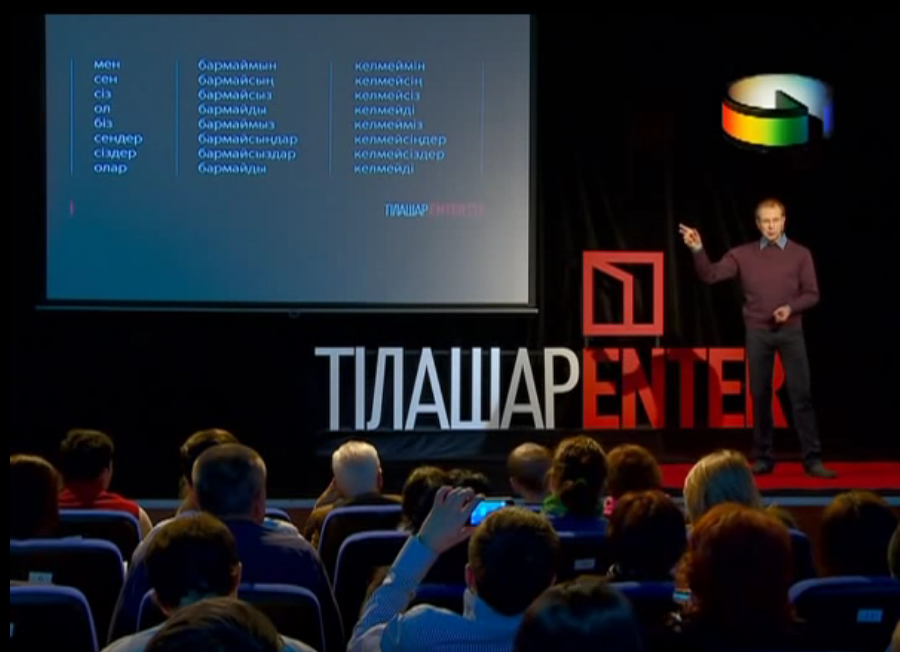
Who exactly had a hand in dragging Petrov into the Kazakh market of language services is unknown; it cannot be ruled out that it was Petrov's "brilliant drinking buddy" Boreyko. However, whoever it was, he achieved his goal: Petrov has a separate advertising site petrov.kz , (recently the name has changed to gibberish "xn - b1af1acg", but the content remains the same) where our hero does not hesitate to declare [ highlighting mine - D.P.] :
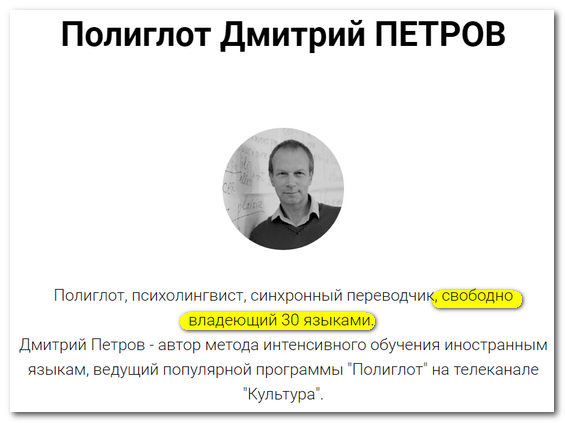
The site also regularly publishes information about Petrov's visits to Kazakhstan (the next visits are scheduled to Almaty on June 11 and Nur-Sultan on June 15), during which he promises that the audience will speak English in 4 days . Ches in Kazakhstan is generously paid, because booking one place, for example, in Almaty costs 200,000 tenge ( 528.40 US dollars / 34,050 rubles ), including a 10 percent discount.
End of 2011 - beginning of 2012 . A turning point. Petrov is invited to participate as a host in the filming of the Polyglot program (with a name that can be interpreted as an advertisement for a well-known person). Here is how Petrov himself tells about the beginning of participation in an interview with Kommersant in March 2014: “My old friend, writer and TV presenter Oleg Shishkin, introduced me to the director and editor-in-chief of the channel Sergey Shumakov. The MB group production company (now M-production) took on the project.”
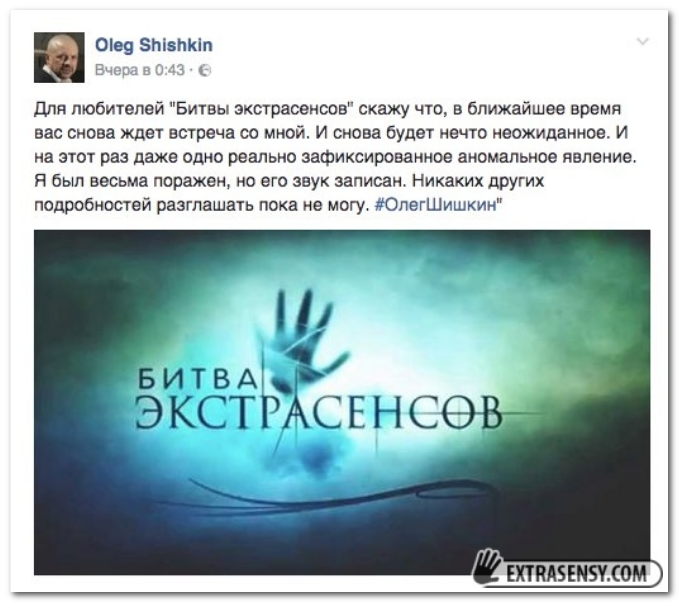
(In parentheses, we note that Petrov's next "old comrade" - Oleg Shishkin, who calls himself a historian - subsequently became one of the participants in the first season of Polyglot, and then, deciding not to stop there, appeared in the role of an expert (if this word is even in this appropriate in the context) in the infamous show for scammers (magicians, sorcerers, sorcerers, fortune tellers, etc.) of all stripes "The Battle of Psychics", where with his expert opinion he confirmed the arrival of Ilyich's spirit in the Gorki Leninsky Museum exactly during the filming of the next release).
2012 . Courses under the loud name “Dmitry Petrov’s Center for Innovative and Communicative Linguistics” are starting to work in Moscow (it cannot be ruled out that this is the name chosen to form the abbreviation CYCL from it, which is sometimes found in Petrov, although he is unlikely to have taken into account the “magic” of this word [ specifically its ambiguity]). The corporate color is purple, the description is categorical: “Dmitry Petrov’s method is based on an innovative training program that allows you to learn a foreign language in 16 lessons lasting 1 hour each . If you want to quickly overcome the language barrier, then there is no simpler, more understandable and more productive way. ". One of the mottos of the school is “Anyone can become a polyglot!”, which does not at all refer to the program “Polyglot”, but is an ordinary coincidence, even taking into account the strangeness of the slogan itself, because students come to courses, as a rule, not for polyglos, but for solving the quite practical problem of mastering one or another foreign language. It is said about Petrov: "... a polyglot , an experienced simultaneous interpreter, a popular psycholinguist and a professional teacher."

2013 . In Moscow, an organization called the Dmitry Petrov Center publishes a book called English. Basic training. By the time this article was written (May 2019), about 10 books on various languages, including Chinese, were published under the authorship of Petrov, the teaching of the basic course of which Petrov could not implement without the help of a Chinese teacher. The Center also published 3 books on the Russian language for students who speak Spanish, English and Serbian. I deliberately do not call the products produced at the Stakhanovite pace as textbooks, since they do not meet the requirements put forward for textbooks in the Russian Federation (neither in content, nor purely formally, because the book has no reviewers, approvals or recommendations).This obvious circumstance, however, does not prevent Petrov and his team from proudly calling their crafts textbooks both on the school's website and in the books themselves. It is also curious that on the cover of the aforementioned "Basic Training" the only author is "methodist", but inside the book in the section of copyright holders next to Petrov we see another name - Ogievsky V.V., which may indicate that Petrov wrote the book not by myself.
And, of course, it’s a big sin to suspect Petrov that he himself didn’t write anything at all, since he was busy promoting his personal brand, and placed his name on the cover so that the trade would go faster.

2014 . Apparently, having decided to hit the pockets of consumers even harder, Petrov uses heavy artillery in the form of a series of books (there is accurate information about English, French, Spanish, Italian and Chinese) “Polyglot . 16 Lessons ", equipped with the logo of the federal channel "Russia - Culture" and two DVD discs with transmission materials.
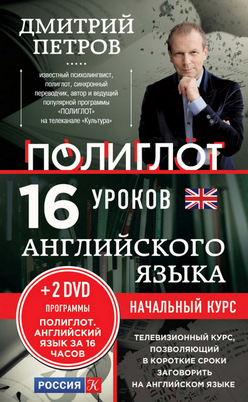
Since it is not Petrov's manual structure that is engaged in the release of books, but, after all, the Eksmo publishing house, the annotation to the book no longer contains the word "textbook", limiting itself to "publication" and "book". The methodological value of the book should be mentioned separately, which will be done below, but in this section I will draw your attention to the gross negligence with which this initial course was prepared (which is doubly dangerous, because people who do not speak the language are initially given incorrect information):
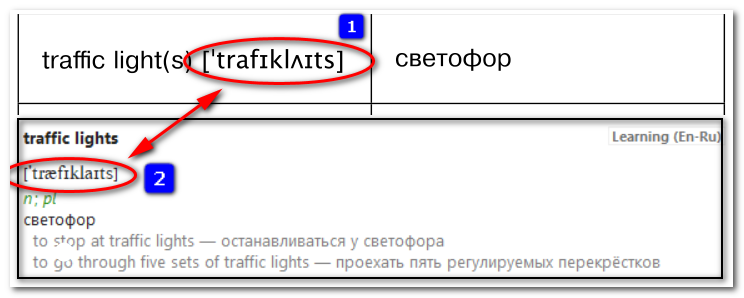
It would seem a mere trifle: to correctly copy a transcription that has already been written many times before you, but Petrov managed to make a mistake even in this.
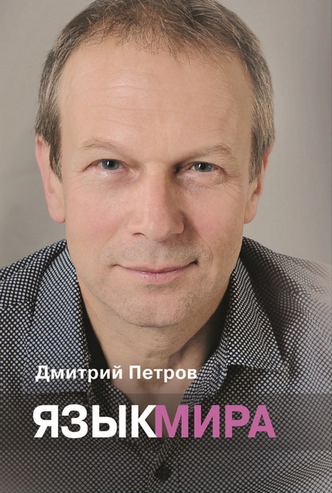
2018 . In the “Dmitry Petrov Center”, already familiar to us, another book is published - “ The Language of the World ”, designed in the corporate colors of his courses. In it, our hero continues to poison near-linguistic tales, but due to the lack of new tales and the desire to release a book edition, and not an openly advertising brochure, Petrov resorts to a well-known trick, which one of the readers complains about in her brief but capacious review [ emphasis bold mine is D.P. ]:
I'm upset ... The book is something interesting thoughts of an interesting person! BUT!!! It comes packaged, apparently so that you don’t look inside ... Because if you open it, then the font size, paragraph spacing and margins will scream to you that the book was not written to convey some thoughts, ideas and morals, but to be stretched out over 300 pages, published and sold at a higher price! I did not expect this from Dmitry Petrov.
September 2019. On his pages on social networks, Petrov announces the imminent start of the television course “ The Tatar language with Dmitry Petrov. Let's learn Tatar in 8 hours " on the regional channel "Tatarstan-24". As reported in the Tatar media, the idea to invite such a prominent specialist in teaching the Tatar language came to the head of the press service of the President of Tatarstan Eduard Khairullin (one of the TV students). The choice of the authorities fell on Petrov as "an external expert who knows everything about languages, would figure it out himself and teach [the residents of Tatarstan]". The purpose of the program is not difficult to imagine - to help viewers "master the linguistic "matrix" of the Tatar language." For the cover photo, Petrov got a skullcap (or got it from the bins, where it had been gathering dust since “mystical” times) and at the very first lesson, among other revelations, he stated that “every language has an absolutely iron logic”, apparently confusing natural languages (used by living people, not robots) with logical/programming/quasi-languages. Already according to the established good tradition, Dmitry does not demonstrate any communication skills in the language he teaches.
In the light of the facts of Petrov's biography, it is possible and necessary to expect from him far from only this. Of course, the above are far from all, but only some of the main points of his route on the way to increasing sales. So, for example, his ability, to put it simply, to lick someone at the right time was not analyzed in detail (“I put Mutko “five” for courage” in the light of the news that his former student Mutko, who, in his bureaucratic way, tried everything charms of "Petrov's method",
“On May 28 [2015] in Zurich, I spoke to journalists in English. The minister first commented on Russia's preparations for hosting the 2018 World Cup, and then, not understanding the question of whom he would vote for in the FIFA presidential elections, he uttered a phrase from a mixture of English and Russian words ").
The given biographical information gives reason to think: is Petrov an unscrupulous businessman who, thanks to his acquaintances and “blat”, has opened the way to enrichment by fooling wide sections of the Russian and foreign Russian-speaking population? Perhaps he is not a psycholinguist, but an ordinary impostor? We will deal with the issue of its connection with psycholinguistics in the next paragraph.
"Popular Psycholinguist"
This is how he is presented on the school website, this is how he writes in all his books. To understand why Petrov lies, presenting himself as a psycholinguist or agreeing with such a characterization in his address, it is worth understanding what is the subject of study of psycholinguistics - an interdisciplinary field at the intersection of linguistics and psychology - and what methods it uses in this case. Let us focus on the Russian tradition of psycholinguistic research in order to keep the presentation as compact as possible. In the history of Russian linguistics, there are two world-famous scientists who can be considered pioneers in this sense. The first is the Polish-Russian linguist Baudouin de Courtenay (1879–1918), the founder of the Kazan school of linguistics , who was the first to observe and experimenthe used special equipment over live speech , and one of his students created the first phonetic laboratory in Russia in Kazan.
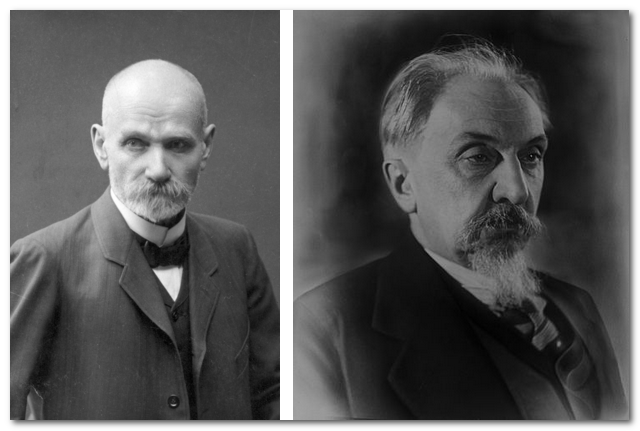
The attention of linguistics to the processes of speaking, listening and understanding of speech begins with the activities of Baudouin de Courtenay. The second scientist - Lev Shcherba, who founded the phonetic laboratory in St. Petersburg to this day; one of his main interests in the field of psycholinguistics was the experimental study of the processes of mastering a non-native language. The contribution of Shcherba (as, indeed, of de Courtenay) to linguistics is enormous and, of course, is not limited to psycholinguistics, but for the purposes of our discussion, attention should be paid to several points: (1) both de Courtenay and Shcherba studied language as a mental phenomenon, providing social connections; (2) in their scientific pursuits they used the method of scientific experimentation, often carried out with special equipment; (3) they recorded the results of their work in scientific papers, some of which have not lost their relevance to this day.
If you try to find (with the help of Google Scholar or in another way) the results of the scientific research of the “popular psycholinguist” Petrov, you will fail - he does not have a single work even remotely related to psycholinguistics, and to be more precise, no scientific works at all . More - and even more terrible - than that, in his public speeches, Petrov not only profanes, but completely discredits psycholinguistics, giving completely delusional, anti-scientific, full of mystic comments on topics, the foundation of knowledge about which science has long laid.
Here are some examples from the Anthropology mentioned above. In linguistics and the methodology of teaching foreign languages, it has long been experimentally established that various psychophysiological mechanisms are involved in the development of various speech skills. It is for this purpose that exercises for instilling and reinforcing them are divided, in particular, into receptive (listening to the text, etc.), reproductive (retelling a text familiar to listeners, etc.) and productive (generating one's own statements). To consider a language in a truly scientific way, you must first analyze it (decompose it into parts in order to understand them), and then synthesize it .studied. Of course, such an explanation requires some attention from the audience, some of which may suspect something is wrong and stop being firmly convinced that learning any language in record time is easy and simple. Realizing such a danger, Petrov, in response to Dibrov’s remark that to speak a language is to be able to speak it and understand what they say to you in response (generally, a simple and logical explanation), bursts into unscientific nonsense, which, if you try to perceive it seriously, blocks the way to the analysis of that complex phenomenon that is language, and turns it into a fetish:
Later in the same program, in response to a listener's request to comment on the information he read in the newspaper that a certain girl "from southern cities" was born with knowledge of 120 (!) Languages (including rare ones and dialects that no one can understand , even “experienced translators”), Petrov first asks for the girl’s “phone number”, but since the viewer does not have a “phone number”, he gives the described case, as always, a verified psycholinguistic assessment:
“Direct exit to the shell” sounds strong and convincing, no doubt, but this is pure charlatanism, so base that it can’t even be called pseudoscience: stories about babies who, having not had time to leave their mother’s womb, already speak hundreds of languages \u200b\u200b simultaneously, time from time to time they appear in the yellow press next to the recipes for canning tomatoes and cucumbers, in order to distract / entertain people with their sensationalism and, instilling in them the idea that anything can happen in the world, lower the bar of their critical thinking very very low. In this case, Petrov, relaying these "icteric" ideas, discredits himself not only as an alleged psycholinguist (who must know for sure that the ability to master the language of a child stems from his general cognitive (cognitive) abilities, and to activate this ability, he needs “working material” in the form of oral speech, which he processes not instantly with division into different languages, but very gradually, by trial and error), but also as a person who has received a higher education and is able to work with information . Children's speech is one of the main objects of study in psycholinguistics; by what the so-called psycholinguist can say about her, one can confidently judge what level of specialist he is.
It would seem that within one program, after a rant about connecting infants to verbal shells, there is nowhere to fall below, but Petrov still manages to do this. This time, he does not comment on disinformation, but voices it on his own initiative, responding to the host’s request to illustrate the concept of “ownership of the word” he mentioned (which, by the way, is unknown to linguistic science):
Talk about “ownership of the word” smoothly turns into a description of the castration technique with this very word at a distance. After such statements, there is no doubt that Petrov is indeed a major specialist not only in the field of psycholinguistics, but also in urology.
In general, "Anthropology" and other programs with the participation of Petrov almost entirely consist of such nonsense, which he sometimes (apparently having memorized) repeats word for word. People who are straightforward in their assessments could call Dmitry a liar, a balabol and a windbag all rolled into one, but we will avoid such assessments as much as possible and characterize him as a storyteller or (to put it in a fashionable way) storyteller, covered with a thick layer of mysticism, but by no means a psycholinguist , which he is neither by virtue of his education, nor on the basis of his contribution to this area (since there is no contribution, but there are utter nonsense hostile to science, only a small part of which is presented in the video clips in this article). Mysticism is the antithesis of science, therefore the “free mystic” Petrov is not a scientist, not a linguist, and not a psycholinguist.
"Unique Polyglot"

Perhaps the main argument put forward implicitly by Petrov himself and quite clearly by his supporters and patrons in favor of the unique usefulness of our hero as a teacher of foreign languages: if he managed to learn so many languages, then he knows a lot about this matter and will teach you. At the same time, not a single known source names the exact number of languages that Petrov owns or is at least familiar with (whatever that means). So, for example, on the website of his school, in the corresponding section , it says: “ Thanks to his methodology, Dmitry learned more than 30 languages”, from which it can be assumed that Petrov himself does not know this number or deliberately gives vague information in order to free up room for maneuver - especially since at least some complete list of these languages \u200b\u200bwas not found anywhere. Sometimes Dmitry aims for more, as, for example, in the aforementioned interview with Kommersant, where, in response to a journalist’s remark that he knows about 30 languages, he declares: “In fact, the languages that I studied at different periods of my life, even more ."
Next to the number of languages that Petrov allegedly owns or that he allegedly learned, there often appears a more modest number of languages with which, according to his own statements, he works professionally, is able to translate simultaneously in any combination and uses them "in real life" (from references on the Vokrug TV website), specifically eight : English, German, Czech, French, Spanish, Italian, Hindi and Greek. However, already in an interview in 2018, Petrov states the following:
“There are several languages that I can work with quite professionally as a teacher, translator. These are the main European languages, five or six European languages.”
From this short fragment, it becomes clear that Petrov, allegedly knowing several languages professionally, finds it difficult to say whether there are five or six of them (although five or six are not such big numbers to get confused in them, especially when it comes to working languages) , which may indicate that he is lying many times, and the vague nature of his answers traditionally leaves himself room for subsequent maneuvers.
Segments of Petrov's spontaneous mono- or dialogic speech in these languages (with one significant exception) could not be found anywhere (of course, this does not include spoken words and their combinations from the Polyglot, since it is a pre-prepared set). This exception is the broadcast of the Spanish-language studio of the Russia Today TV channel , where Petrov was invited to talk about himself and his “method”. As far as we know, this is the only recorded case when Petrov dared to speak a foreign language (moreover, the one with which he allegedly works professionally ) in a productive speech format. What came of it can be seen in the following video, recorded around 2012:
Stiffness, lack of fluency, limited vocabulary (with the most active involvement of internationalisms to facilitate their task) immediately become noticeable, as evidenced by the users who watched this video, for some of whom Spanish is their native language. We emphasize once again that we are talking about Petrov's active language, with which he allegedly works professionally and into which he is able to translate simultaneously . The last circumstance, in the light of the level of skills that we observe on the video, is of great bewilderment, because for simultaneous translation into a non-native language (the so-called "language B" in the classification of interpreters), you need to speak it at the highest level (and even C2 level ByCEFR classification will probably not be enough here, because it will take considerable time to further improve and strengthen skills after formally reaching the highest level). What Petrov demonstrated on the air, with the most generous assessment, does not deserve a level above B1, which contrasts especially strongly with the fluent speech of the presenter.
Additionally, the opinion of a user who commented on this article regarding gross grammatical errors that Petrov made during an interview with the Spanish edition of RT deserves attention :
By the way, in the above example of a dialogue with a Spanish TV presenter, in the very first minutes, a citizen not only speaks the elementary language of a first-year student, but also makes quite obvious mistakes.
He lists the ancient languages that he allegedly owns, and his "griego" corresponds to both Modern Greek and Ancient Greek, while other Greek. - “griego antiguo”. Further, Old Slavonic - immediately sculpts “viejo slavonico”. Here, sorry, nothing, I have no other reaction than hysterical laughter. Is it okay that he is antiguo eslavo? And then he gives out something that even the first year will not say when drunk - “habla EN idiomas”. I'm sorry, what? What kind of simultaneous interpreter is he? Grandma's translator across the street or groceries down the toilet? In general, these are the basics, elementario, where they start learning Spanish, the control of the verb “hablar” WITHOUT A PREPOSITION. ¿Habla usted español? Perhaps even schoolchildren know. And forgive this despite the fact that Spanish in the same foreign language was my second language, they taught it very badly, plus more than twenty years have passed since then. I’m generally silent about Petrov’s English, the level is “hug and cry”. Even Ilona Davydova shudders somewhere.
So, there is no objective evidence of Petrov's polyglossia or even a high-level command of any foreign language . However, what, in this case, does the concept of polyglossy mean in general, and to what extent are its boundaries outlined? It is noteworthy that in the authoritative English-language multivolume Encyclopedia of Language and Linguistics ( 2nd edition, Elsevier) there is no separate article on polyglossia. There is also no entry by that title in David Crystal's popular Dictionary of Linguistics and Phonetics., 6th edition, Blackwell Publishing); in specialized sources, this concept is absent in the well-known encyclopedia “Linguistics. Big Encyclopedic Dictionary" (edited by V. N. Yartseva, 1998 [reprint of the 1990 edition], "Great Russian Encyclopedia") and in the "Dictionary of Linguistic Terms" by O. S. Akhmanova (1966, " Soviet Encyclopedia). At the same time, the concept of “multilingualism” that is somewhat similar in meaning can be found in all the above works. There are two meanings:
- a sociolinguistic term to designate a situation in a linguistic community in which two or more languages are used in it, as well as, by analogy, the corresponding property of individual representatives of this community (Crystal); the presence of several languages in a given territory ((Akhmanova);
- equally perfect command of several languages (Akhmanova).
Thus, definition No. 1 cannot be applied to our case of alleged phenomenal abilities and personal giftedness, since cases of multilingualism in understanding No. 1 are a consequence of the linguistic situation in a linguistic community. Definition No. 2 would suit us if it were not for its accuracy, which throws Petrov beyond the limits of the phenomenon he describes (even Petrov has not yet had time to turn his tongue to declare that he speaks all 30 or more languages equally well).
From this we can conclude that the concept of polyglossia (if we consider it synonymous with multilingualism) in a strictly linguistic sense cannot be applied to Petrov, and if we talk about polyglossia as a term, then in modern science of language it is hardly usable - presumably because it does not possess of special value and has very blurred boundaries. In other words, this concept is evaluative, vague and purely “everyday” (see, for example, the definition of a polyglot in Kuznetsov’s Great Explanatory Dictionary of the Russian Language: “ A polyglot is a person who knows many languages”). It is this vagueness that our hero is very actively exploiting, without providing evidence of possession of at least any number of languages from the declared ones.
To questions about how many languages he knows, Petrov has a cunning answer: “Perfectly - not one, even Russian,” but at the same time he does not refuse the title of a polyglot. True, sometimes conscience makes itself felt and Dmitry says something that we can’t argue with in any way:
“ You can name, in principle, any figure, and it will be true, because I perceive the knowledge of languages as something that does not have a clear definition .”
Thanks to Dmitry for an honest answer - this is rarely heard from him, because after these words the house of cards called "Petrov's Polyglossia" collapses completely. Does he know 8, 30, 50 or as many as 120 languages - what difference does it make if you can say "any number" and it will be true?
Testimony of a friend of Petrov - Dmitry Ermolovich . The already mentioned translator Dmitry Ermolovich is an old friend of Petrov. They have known each other for many years, almost since their student days, and so closely that when Petrov calls Yermolovich, he says into the phone: “Hi, Dima. This is Dima” (Yermolovich himself recalls this; see the link to his website above). Yermolovich, however, unlike Petrov, has a certain relation to science and does not carry frank nonsense (there are a number of claims against him that I voiced on his website: they mainly concerned his unwillingness to give references to other people whose work he obviously used in his textbook, but he cannot be called an outright charlatan). Some time ago, on the Yermolovich website, I started a discussion called “ A sober assessment of the so-called. “Method of Dmitry Petrov””, which concerned the questionable value aspects of the “methodology”. We will talk about the "method" itself in the next section, and now we will point out some interesting facts that are directly related to Petrov's alleged polyglossia. By a strange coincidence, as soon as the discussion thread on Yermolovich's website began to attract the attention of the audience and accumulate the thoughts of Yermolovich himself and other people that could destroy the myth of Petrov the polyglot, it was completely deleted without giving reasons. Whether the cowardice of Yermolovich himself became such a reason or a call from someone who said the magical “Hi, Dima. It’s Dima…” it’s impossible to establish now, but I managed to get the discussion pages from the cache of search engines, so if necessary I’m ready to provide evidence of what was written there (moreover, all the remarks received in response to my question were duplicated in e-mails and have been saved by me).
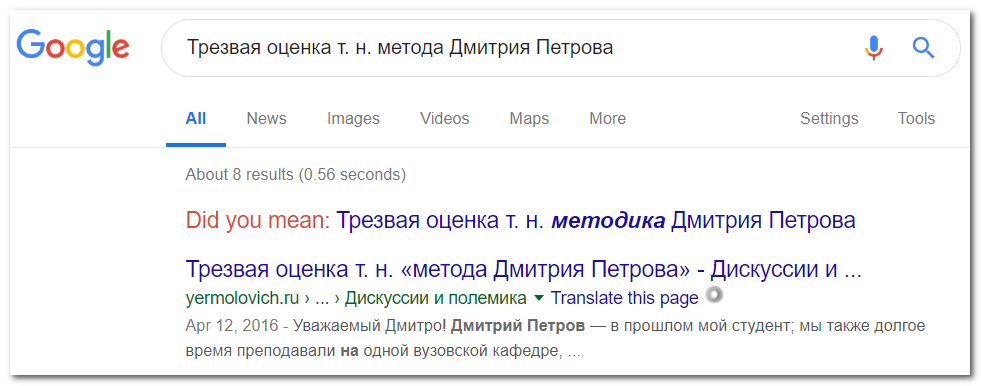
In the course of this subsequently remote discussion, I informed its participants that the only evidence of Petrov's polyglossia, which is given in Wikipedia, is a link to Yermolovich's website, where he refers to Petrov as such. What Yermolovich himself answered further surprised not only me. I will allow myself to quote his answer in full, without abbreviations, since this will be the only source (apart from duplication in letters and the discussion of the Wikipedia article initiated by me) where this answer is given:
“Dear participants in the discussion, it was a surprise for me to learn from your comments that Wikipedia refers to my site (and, in fact, only to it) to justify the characterization of a “polyglot” in relation to D.Yu. Petrov.
Apparently, it makes sense to give an explanation. The word polyglot , according to the definition of the Big Encyclopedic Dictionary (M. 1991, v. 2), means "a person who speaks many languages." This definition lacks any specification of the minimum degree and quality of language proficiency that would justify such a characterization.
But it seems to me that if a person was able to conduct eight television courses in various foreign languages, including those belonging to different language families and groups, then - regardless of evaluative opinions about the level, content and methodological elaboration of these courses - such a person can be called polyglot, and it is for this reason that I called Dmitry Yuryevich Petrov as such . (Similarly to the definition of a singer is any public performer of songs to music who regularly gathers an audience for his concerts - regardless of what we think about his vocal abilities, musical literacy, the quality of his songs, etc.).
At the same time, I must state that, apart from fragments of the television programs of the Polyglot cycle, I have never heard or seen how Dmitry Petrov communicates in any foreign language or translates from any language other than English . (Please do not consider this statement as an estimate: it is a statement of fact, which is due, perhaps, only to the limited experience of my observation of his activities.)”
Firstly, Wikipedia, as the only evidence of Petrov's polyglossia, pointed to a thank you page dedicated to him on the website of his friend Yermolovich. Secondly, Yermolovich himself never heard or saw Petrov use any foreign language other than English. Thirdly, when Yermolovich at the beginning of his answer speaks of surprise, this can be understood as the fact that even in his opinion, Wikipedia has passed off as an authoritative source one that is not due to partiality. As for Yermolovich’s attempt to substantiate Petrov’s polyglossia by the fact that he pretended to teach various languages in the Polyglot program, Yermolovich loses sight of the obvious fact: all the material recorded on camera and presented as a TV program is exclusively staged (reproductive) in nature : everything happens according to the script, Petrov knows what and in what sequence he will say, what exactly to write on the board, etc .; moreover, if a mistake is made, everything can be rewritten or cut out (however, even the possibilities of video editing did not save the program from a lot of gross mistakes made by Petrov, about which see below). Is it possible in such conditions to talk about an objective assessment of knowledge of the language? The question is rhetorical.
Do you know Romanian? “Romanian… Uh-uh… I used to know Moldavian.” This is exactly how - evasively - Dmitry Petrov answered the host's direct question in 2000:
It's been 12 years. Petrov, probably, did not waste time and mastered Romanian, which follows from his second interview with Kommersant (2012) [ emphasis in bold is mine - D.P. ]:
“...simultaneous translator Dmitry Petrov studied more than 30 languages. He constantly works with 7–8 European languages (and sometimes translates from English into Spanish or from Italian into English), and can use two or three dozen when necessary. These dozens include Latin, Hungarian, Romanian , Dari, Hindi, Urdu, Hebrew…”
Another 3 years have passed. A person with the nickname webzuweb , a specialist in IT and website development, an active user of the well-known professionally oriented portal habr.com , decided for this community to record a conversation with Petrov, thank him for the Polyglot course, and at the same time teach him the basics of programming. As a result, an interview was published titled How to teach a polyglot a new language? ". It is notable for a short but very revealing fragment that was recorded on video. The interviewer, a native speaker of a certain dialect (later it turned out to be the Moldovan language), decided to play the game “Guess the language from a few spoken phrases” with Petrov. This is what came out of it:
First try : The interviewer says a few phrases. Quite a long pause. Finally, Petrov says, " The same thing again ."
Second attempt : The interviewer says the same thing. Petrov confidently says, " It's a Caucasian language ." The interviewer fixes the error.
Third attempt : The interviewer gesticulates animatedly and calls out another set of phrases. Petrov: " Oh! It's Moldovan ."
I don’t know if this fragment was glued together and how many more mistakes Petrov made before it dawned on him (did it dawn on him?). Let us assume, however, that there were no glues. In this case, it turns out that the “unique polyglot” Petrov, who “once knew” the Moldovan language, is able to use the Romanian language when he needs it (see above quote from the interview; for reference, I will say that these languages have so much in common, that Moldavian is now considered the name of Romanian on the territory of Moldova or, in extreme cases, its dialect), could not at first even understand what language it was addressed in, and then put forward a very far from the truth assumption.
You can look for as many excuses for a “polyglot” as you like, but the most obvious and simple answer is that Dmitry Petrov lies about the number of languages \u200b\u200bhe knows, and when it comes to testing his knowledge (which happens extremely rarely and, apparently, without him consent before recording), involuntarily reveals his true face, which has many features in common with the physiognomy of "Mr. Pelmennaya" Alexander Kuritsyn (Nevsky), who fancies himself the owner of the title "Mr. Universe", but in fact hides from journalists when they come to him , armed with facts, or want to check whether he is “straight” or “chemist”.
Chauvinistic raid. A person who presents himself as a linguist, who claims to love languages, and besides (at least officially) teaching at a Russian philological university, cannot fail to know that the eastern group of Slavic languages consists of three languages: Russian, Ukrainian, Belarusian . Not a single linguist has questioned this fact. Petrov, however, having decided to play with the moods of the target audience of his book on verbal magic, thinks otherwise, as is clear from the following passage, taken from chapter 6 of "In Bed with an Elephant":
“I must tell you: the Ukrainian language is a very vague concept.”
We explain to Petrov: this is not a vague “concept”, but his knowledge of language families and groups, as well as the languages of neighboring countries, therefore, in between commercial tours of the cities of Russia and neighboring countries, he does not interfere with repeating the basic course of general linguistics or language typology.
Petrov - the record holder of the Guinness Book of Records in 1998? It is this information that can be very often found in the press, as well as in sources directly related to Petrov. In particular, you can read about the record in the description of Petrov's TEDx Talks speech, which we mentioned above, on the official YouTube channel (the author's spelling is preserved): “She speaks thirty languages, works as a simultaneous translator in eight of them. This fact is noted in the Guinness Book of Records in 1998. ” The assumption that this information came directly from Petrov is additionally confirmed by the fact that some time ago a remark about Dima the record holder was present on his aforementioned Kazakhstan site, but now the corresponding page is not loading:

Additionally, we find this information on the website of the “free mystics” group, which Petrov was or still is a member of, so everything indicates that it was Dmitry who recorded himself in the world record holders. Checking the presence of his name in the 1998 edition of Knigi showed that Petrov is not there, and could not be, because Petrov prudently keeps at a safe distance from any opportunity to test his language knowledge, because such an exam can have disastrous consequences for his exaggerated a reputation that rests on outright and large-scale lies . It should be noted that the scale of this lie has an undeniable advantage for Petrov, who has firmly mastered the Big Lie propaganda technique:
“If you tell big enough lies, and tell them often enough, people will believe that you are telling the truth, even if what you say is complete nonsense”
(quote from the book: Richard Belzer, UFOs, JFK, and Elvis: Conspiracies You Don't Have to Be Crazy to Believe ).
Summing up this section, we conclude that Petrov is a psychophysical resonator with a hazy look, a sorcerer with a guitar, a mystic in a hat, but not a polyglot; we do not have positive, independently confirmed evidence of his polyglossia . In the next section, we will study his rumored huge and unique contribution to the methodology of teaching any foreign language and try to delve into the essence of the “Petrov method”.
"Methodist, which was not"

Let's start with definitions, because here, as in the previous sections, they are of great importance. Calling himself the author of the methodology, Petrov thereby agrees that the method as a phenomenon exists, and therefore has a clear definition. At least, Petrov did not give any alternative definitions to the concept of "method", each time preferring to immediately indulge in praising his method, and therefore unique. We should immediately make a reservation: as a person who is not very familiar with pedagogical science, Petrov regularly and erroneously identifies methodology and method (for example, on a website dedicated to his Kazakh chess, he uses these two words almost alternately). In fact, there is an important difference between them. Methodology (teaching foreign languages) —it is pedagogical science. The word "methodology" is also used in the sense of "a set of forms, methods and techniques of the teacher's work." Method is the subject of the study of methodology; that answers the question "How to teach?". There are many known methods: the direct, communicative, oral method of Palmer, the audio-lingual Frieza-Lado method, etc. All of them are formulated in such a way that when describing the learning process, the name of the method immediately becomes clear from the combination of methodological techniques used in it. To avoid confusion, we will call the object of our consideration “Petrov’s method”, since he himself regularly gets confused in the testimony (it may well be because the word “method” has three letters more, which gives Dima reason to believe that it is this choice that will give him authority in the eyes of the public).
Petrov rushes from air to air with the spell “my method is 50% pure mathematics and 50% pure psychology”, but we, wanting to get more detailed information, will turn to the section “Dmitry Petrov’s Methodology” of the Petrov school website, because where else , how not there, an exhaustive list of unique techniques should be presented, the combination of which constitutes the “Petrov method”? It is immediately clear that the distinction between methodology and method is also not made here (the words are used as synonyms). One way or another, the key features of the “method” (or “method”, as we call it) are as follows (hereinafter - quotes from the indicated section, which are not specially enclosed in quotes):
- classes are held in a friendly atmosphere, a positive emotional background;
- already at the first lesson, the students, together with the mentor, learn to communicate with each other;
- in the learning process, basic grammatical constructions are brought to automatism;
- the main emphasis is on the study of the most frequent words;
- in the classroom, students do not communicate on abstract topics, but talk about things that are interesting to them;
- vivid associations and images.
Note . After the publication of this material, the Petrovites “cleaned up” this page on their website:
- item number 2 about the mentor and “communication among themselves” was missing,
- associations and images lost their brightness,
- lost "emphasis on the study of the most frequent words",
- several "unique features" have been reformulated,
however, the deleted snippets are still visible in the search engine results:
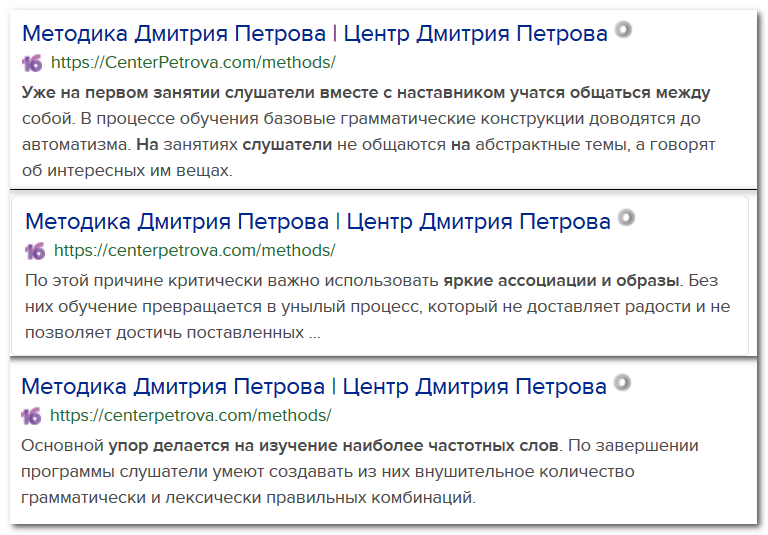
Naive people unfamiliar with the methodology, having barely read the list to the end, are already ready to drop everything and enroll in Petrov’s school (even learning that he himself does not conduct classes there, preferring advertising sermons in the Direct Speech lecture hall ) . I urge such people, however, to think a little, because the whole range of “highlights” so rosily described is just a cunning manipulation designed to hide the fact that the king has no clothes on himself, and here's why:
Point 1 ( friendly atmosphere ). As a methodical technique, course participants are sold a non-specific installation , tantamount to an exhortation "Come to us, we are fine here." It has the same relation to the methodology of teaching a foreign language as, for example, the following statement: “In the classroom at Petrov’s school, students sit on chairs, inhale air through their nose, and then exhale (also through their nose or already through their mouth, as it is more convenient for someone)”. The absence of stress factors is not a methodological technique, but an element objectively necessary for collective work, so obvious that it is presumed and does not need to be described ( unless, of course, the task is to pour as much “water” as possible).). To represent it as a unique method element is to manipulate potential listeners.
Item 2 ( you chat to communicate already in the first lesson ). Remember that language is the most important means of human communication . In other words, language is needed so that people can “ communicate with each other ”, as paragraph 2 says. Therefore, “learning to communicate with each other” means “learning a language” (for communication). As a result, paragraph 2 actually tells us that, having come to the courses, we will start learning the language from the first lesson. But they could not start, but just sit and disperse! The second point is no less banal than the first; any modern language school could record it for itself, but only Petrov (not counting his followers) manages to inflate it to the level of a unique methodological device.
Point 3 (and automatic constructions ). Terry manipulation, the essence of which we will reveal in a few steps. Step 1: Teaching a foreign language is a process of instilling a number of skills and abilities. Step 2: A skill is a mental neoplasm by which the learner is able to perform an action rationally, accurately and quickly without the active use of consciousness to regulate it (i.e. automated / automatic ). Step 3: hence {teaching a foreign language (skills [automaticity])} or: without automatism there are no skills, and without skills there is no learning a foreign language! What the cunning Petrov does: breaksthis is a harmonious logical chain, extracts [automatism] from it and sells it as its own unique development, which, at the same time, is already by definition (through skill) included in the teaching process! At the output, we have another banality in a shiny wrapper.
Point 4 (at the point on the frequency of words ). It would seem that this is bad, but this statement is sold in a package with another, which Petrov regularly voices publicly: “ There is a basic dictionary consisting of 300–350 words that cover 90% of our speech ” ( “16 English lessons. Initial course", 2014, p. 27 ). It is these words, apparently, that are served in the classroom, talking about the frequency and 90%. Of course, this is a lie . For example, according to the data of one of the creators of the audio-lingual method, the American methodologist R. Lado, which he outlined in the book "Teaching Language" (R. Lado, Language Teaching, p. 16), the minimum dictionary is:
- for speaking - 2 thousand words;
- for reading - 7 thousand words;
- for listening and writing - 3-4 thousand words.
(About the same data with supporting links is given in the first answer to the corresponding question on Quora.)
It is important to note that the minimum vocabulary for reading and listening will be larger , because when generating your own statements in oral speech or in writing, it is almost always possible to say the same thing in other (familiar) words (i.e. use paraphrase ), while as at the reception you are “put before the fact”. Thus, what Petrov sells under the guise of the most frequent words is just a drop in the ocean that will not help you, but you should not know this fact, because the desire to carry money to Petrov may decrease.
Item 5 ( talk about interesting things, not in the abstract ). Variation on the theme of point 1. There are a number of social situations in which the conversation revolves around topics that everyone understands (weather, family, work, etc.), and they happen so often that it would be foolish not to give listeners the necessary speech tools for participation in them, following the same principle of frequency, which was stated in paragraph 4. However, due to the exceptional blurringwording "abstract topics" in it, if desired, you can pack anything. As "interesting things" by Petrov and Co. examples are given: favorite dishes, sports, computer games, life events. Where is the line between an abstract set of words in a particular semantic field (sports, food, computer technology, etc.) and the specific implementation of these words in speech, of course, is not specified anywhere, because it will do .
Item 6 ( bright associations and images ). Part of that mystical baggage that Petrov has been dragging along since the time of the "free mystics". In this context, there are invariably conversations about a living space that you need to enter, and which, in turn, will enter you. It is also worth noting that, speaking of associations, Petrov does not mention the associative method when memorizing words, which really helps some people to a limited extent (see, for example, "English without English: a dictionary of memorization keys" by Samvel Gharibyan, which, unlike from Petrov, in the Guinness Book of Records he was noted for his phenomenal memory, and twice), but about memories at the level “ If you want to enter the Italian language, remember the smell of burnt pizza". Of course, this is not a methodological technique and has nothing to do with the actual training; these “bright associations and images” can only be connected with the “Feel good” attitude from paragraph 1: the sixth paragraph is actually presented as a path to its implementation. Another glass of "water", in which even the associative method of limited applicability is reduced to the level of Peter's trademark "irrational perception".
"Petrov's unique method" consists entirely of "water" and banality, which, if deconstructed, boils down to an empty statement "Petrov will try to teach you the language" and does not contain anything specific and, moreover, unique in order to be called the method of the name of one person.
A few words about the incessantly declared " uniqueness ": this word magically affects the witnesses of the Petrov-polyglot sect, however, the presence of uniqueness is refuted, among other things, by the very history of the attempts of our enterprising "engineer of human souls" to spud language beds, because, as the one dedicated to the "method" informs us ” page on the site of “free mystics”, “ Petrov’s psychocommunicative method ” (as it was called in the early 2000s and has not changed much since then) is built on a communicative-activity approach , which is “ successfully used all over the world and is the most complete and perfect, solving the problem of mastering a foreign language in a complex". Subsequently, Petrov preferred to remain silent about this, so that the halo of uniqueness would not go anywhere.
" Psycholinguistic method ". Sometimes in the performance of Petrov and in his print advertising, such a wording is found. Everything is extremely simple here: the next glass of “water” seems to be something that the world has never seen before. The truth is that any method of teaching a foreign language, as we found out during the analysis of the third paragraph of the “method”, is aimed at the formation of a number of skills and abilities, and a skill, in turn, is a psychological category, a phenomenon of the human psyche, therefore, to claim that the method of teaching a foreign language is psycholinguistic is to declare, making a complex face and screwing up your eyes, that the method of teaching a foreign language is ... a method of teaching a foreign language, after which a stormy applause must be heard from the loyal public.
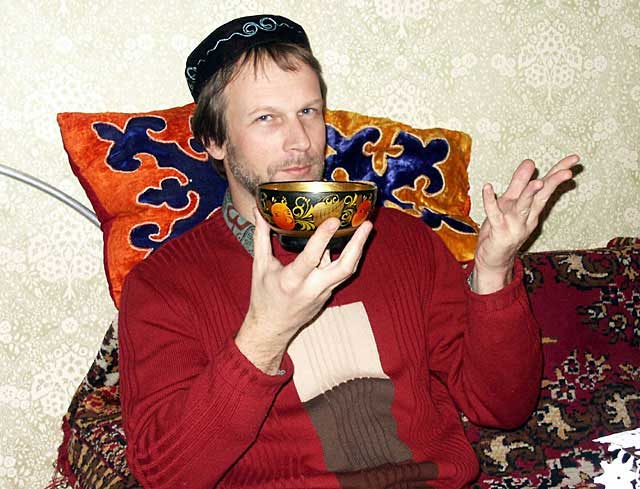
Gross errors and distortions . This motive occupies almost a central place in Petrov's amateur performances. There are so many examples of his stupidities not only of a general language (as shown above), but also of a practical nature that few people have the patience to catalog them, so we will limit ourselves to what becomes obvious already at the initial acquaintance.
- Hack in books . In the aforementioned book "Polyglot" (with the logo of the channel "Russia - Culture") in lesson 1, when describing the rule for the formation of the past tense of verbs, we see the following:
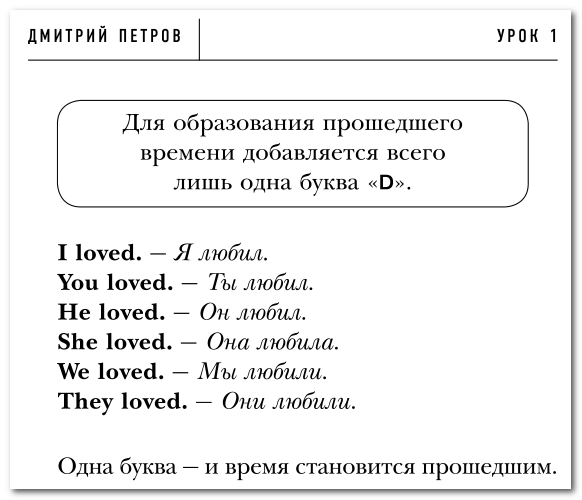
For the sake of maintaining the legend that everything is easy and simple, Petrov misinforms his hopeful admirers and writes nonsense about “ just one letter D ”. The examples are chosen to give the "rule" believability: only the verbs love and live are used in the lesson . However, already in lesson 7, as if it were necessary, without any additional explanation, the past tense form of the verb try appears :

(For readers who have not studied English: in normal English textbooks for foreigners (the example below is taken from Murphy , Essential Grammar in Use, Third Edition, 2007), even at the initial stage, truthful information is indicated, which is then supplemented:

Moreover, the examples are not chosen biased, but honestly; from these, the reader can understand that if the stem of the verb ends in /-e, then /-d is added , but the result is still the letter combination /-ed; graphical changes /-y > /-ied are discussed in a separate note).
Now I suggest that you familiarize yourself with the table of tense forms of the verb choose on p. 85 of lesson 7 [ emphasis mine in red - D.P. ]:
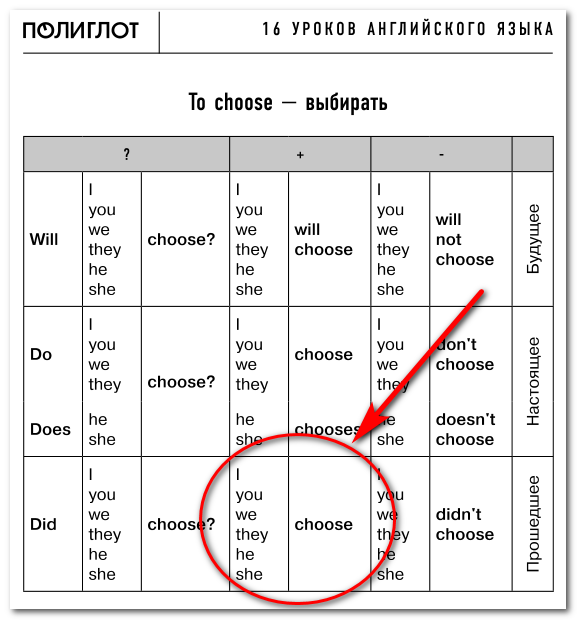
Before us is the case when the desire to publish more books and earn more on them leads to obvious hack-work and oversight. (For those who are not familiar with English: the correct form of the past tense in this case is: chose , do not choose ).
— Obscurantist theory of language change . Another example of pseudoscience performed by Petrov, who likes to show off his erudition and talk about why it happened that the English language lost almost all endings during its development :
“The endings in the English language disappeared within 4 generations, this is from the 15th to the 17th century. What happened to England at that time? England has embarked on the path of industrial development, has embarked on the path of colonial conquest throughout the world. A tough, economical, practical mentality is being formed. There are no more endings, no more cases. We can trace the changes in the language and what happened in the life of the English to the nearest year.”
Those who studied the subject "general linguistics" in the first year of foreign language will immediately notice that the nonsense cited above is like two drops of water similar to the so-called. “ a new doctrine of language ”, which, after October 1917, was put forward by the (by that time already Soviet) linguist N. Marr. Taking advantage of the then political climate, he rapidly moved up the professional ladder due to the tales that language (as well as politics, culture and art) is a superstructure on the economic basis. In other words: the economic formation is changing - the language is changing. This vulgar, politically motivated theoryit was so delusional and dead-end, so contradictory to the real linguistic facts, that it was soon publicly disowned in the USSR; among other things, it stood in the way of the scientific study of language and ignored the obvious fact that language is not a superstructural formation (in the terminology of the Marxists), but a social phenomenon of a special order, with its inherent internal laws of development. Who would have thought that after so many years it would be Dima who would pull this crazy, dust-covered fiction into the light of day and take it into service? The complexity of the morphology of a language does not depend on the level of development of production. And if Dima did research and found that it still depends (which, of course, he didn’t do, because you won’t earn much money on it), then what will he say about the Icelandic or Finnish languages, which, as you know, are used in extremely backward countries? countries with a very low standard of living? There are many counterexamples to refute Petrov's delusions about the nature of language changes, but the essence, I hope, is clear.
In addition, I will point out that Dmitry was mistaken in periodization , although he repeatedly claimed that he studied Old English for a scientific purpose: active disposal of the abundance of formants occurred several centuries earlier (approximately in the 11th-13th centuries) during the transition from Old English to Middle English (mainly influenced by Scandinavian dialects), long before industrial breakthroughs. Moreover, an average of 25 years is considered a generation all over the world , and there can be no talk of any four generations even in the time period that Petrov erroneously suggests. Thus, he managed to make two mistakes within a mistake , and this is not for everyone.
- "Necessary" is not translated into English . Now Dmitry will tell us why, because he made this observation himself:
Dmitry continues to vigorously spur on the horse that has been dead for a long time (see the “new teaching about language” at the link above) and justifies the absence of the word “ must ” in the English language by the fact that it exists in countries “ with less stable economies ”, as a result of which the English language it is " absolutely impossible to translate ". Firstly, since Dmitry, a senior lecturer at the Department of Translation at Moscow State Linguistic University, spoke about translation himself, let us point out to him that a translation specialist from him is the same as a methodologist and psycholinguist (nothing): in the theory of translation, it is known that its unit is not individual words, and statements(even Petrov’s friend Yermolovich knows about this, who should take Dima under his patronage and “drive” him according to the basic theory of translation), therefore, to say that it is “absolutely impossible” to translate a single word into such and such a language is a terrible profanity . Secondly, Dmitry is silent about the fact that the standard English sentence is (as a rule) two-part (that is, subject-predicate) - deviations from this norm exist, but are always due to special circumstances. In Russian, however, one-part (in this case, impersonal ) sentences are a normal phenomenon, therefore, for example, it is quite acceptable to say Ostap cannot sleep and Ostap cannot sleep, while implying in the second sentence that Ostap may be awake due to disturbing thoughts that he is not able to control, which gives us additional tools to clarify thoughts, and this should be appreciated, and not attributed to economic backwardness. If you try to apply Petrov's invention to other cases of one-part composition (for example, to Pasternak's famous lines Melo, melo all over the earth / To all limits, which were translated into English using the formal subject : It swept, it swept on all the earth / At every turning), it turns out that in the Russian language they allegedly hide what is snowing or who is snowing, because in Russia there is Siberia, there is a lot of snow, no one works, does not know or deliberately hides the source of the snowstorm, and the British are specific people, they need to know for sure, who is doing this (at the same time, the “empty” subject it is used exclusively as a placeholder and does not provide any semantic information). We conclude: Petrov pulls individual facts out of their wider context and comes up with completely fantastic, pseudoscientific explanations for the public for fun.
- How did the “method” begin: beat with rods or close your mouth . Petrov went in 2018 to the Age of Happiness festival in Tbilisi, whose audience is people over 50 years old. He talked, got carried away and gave out a source of inspiration when creating his “method” (which, as we have established above, is still a “method”):
There are no questions, only if we consider all his activities as a continuous humorous stand-up, because otherwise there are serious reasons to doubt the veracity of the story about the teacher (boor and monster) and the value of such techniques for the method of teaching foreign languages. This example, by the way, shows that Petrov is trying to drive his listeners into the head that supposedly there are no differences between learning the native language in childhood and additional ones at a later time. It's hard to believe, but Dmitry, who invariably speaks the truth, is lying : these are different processes that are studied by different disciplines ( language acquisition and second language acquisition). You don't need to be a linguist to understand: when mastering a native language, a child is extremely motivated to do so for interactions with the outside world in which it is used, but after mastering one language system, it takes great willpower or a very good reason to start a second language, which seems to be no longer really needed, since one system has been mastered.
Very bad advice . Petrov successfully follows the example of Grigory Oster and gives bad advice, only for adults and about learning foreign languages. There are more and more of them, and I suspect that publishing them in a separate book is just a matter of time.
— Podrazhayte inostrantsam na rodnom yazyke. The bottom line is this: if you want to learn the phonetics of a foreign language, imitate its native speakers ... but at the same time speak Russian! This was said during a stand-up in Tbilisi, but Dima gives this advice not only there. From the video you will learn how to properly make a "proboscis", stick toothpicks into the larynx area of the interlocutors and speak Spanish without opening your mouth.
If you still haven’t learned how to make a “proboscis”, then know that in order to learn pronunciation, you must first be shown which organs of speech are involved in the formation of certain sounds, explain their location, give a sample, check, correct, show again, etc. etc. until you can pronounce them satisfactorily. If you want to learn to speak a foreign language, learn pronunciation in a foreign language , not in your own! But Dima will not advise bad, and now the audience in the hall is laughing carelessly and distorting their faces with grimaces, taking Petrov's advice at face value. I do not believe that he is so stupid that he does not understand the absurdity of his words (his entire ingeniously constructed campaign to capture the educational services market testifies just the opposite); that is,there are signs of fraud in his charlatan activities .
How to make an Italian speak slower . Another extremely useful tip, the effectiveness of which, as always in the case of Petrov, has been scientifically proven:
In his answer, the Italians (like many other peoples that he periodically mentions in other speeches) appear as such stereotypical one-celled fools who let go of their hands - they started talking, grabbed them - fell silent. The above answer to the question of the listener is all that Petrov managed to help her, without saying a word about the need to develop speech hearing - one of the most important listening mechanisms, the improvement of which requires systematic and purposeful work, listening and listening to the flow of speech.
Show "Polyglot" as the apotheosis of mediocre teaching .
[ Updated July 5, 2020 After the publication of this article, critical publications about Petrov's activities began to appear on other platforms, which I periodically inform at the beginning of the material in the "Updates" section. In this section, it would be appropriate to link to a compelling critique of the TV Polyglot (English). In 15 minutes, the author of the analysis manages to clearly prove that Petrov's staging lessons not only do not bring any benefit, but may well cause significant harm to those who take up the study of a new language.]
I deliberately do not analyze this TV show (here we are talking exclusively about the English edition) in detail, because many of its admirers, who claim that after watching it they learned to speak English better than the British themselves with the Americans, may object that, you see, this is a show, a television format, everything is made up there, and it is only needed to draw attention to the problem of learning a foreign language and motivate those who want to, but cannot.
I consider "Polyglot" as one of the most powerful elements of Dmitry's advertising campaign, after which his "method" was revealed to consumers in all its illusory glory, and we have already talked about the "method" above in detail. That is why I will note only some systemic violations that are visible, as they say, to the naked eye:
- Weak pronunciation . As for a simultaneous interpreter and teacher who constantly works with the oral form of the language, Petrov pronounces words very poorly. For example, in the first lesson, he used the verb love ( / lʌv/ ) many times to give examples , but he pronounced it so indistinctly that it was suspiciously similar to laugh ( / lʌf /), i.e., it allowed the final consonant to be stunned, which typical, for example, for the Russian or Polish languages, but not for English.
- Reporting unnecessary information, ignoring relevant data . Fragment of the first lesson:
According to this explanation, it is clear that Petrov does not follow the development of the English language , because it would be useful for students who need English to solve practical problems to know that (1) for a long time you have not divided “you” and “you”, however ( 2) now still tends to “you” (at least in colloquial speech), in connection with which analytical (consisting of several words) forms appear in the language to address a group of people: you all ( y'all ) , you guys . These forms are so actively and regularly used that now there is a question of considering them as full-fledged pronouns of the second person plural. As for thou,then its use is not limited to God: this archaic form still exists in some English dialects. All this information could be presented compactly so that it would have maximum usefulness (information about thou could well be left out of the brackets, because the actual forms of colloquial speech are much more important), but Petrov does not do this.
— Petrov fills the study time with his chatter in Russian .
As was rightly noted in one of the forums dedicated to the discussion of the "Polyglot", Petrov speaks (and, moreover, in Russian) unreasonably much. In the teaching methodology, teacher's remarks are referred to as the term teacher talking time ; they should be as few as possible so that the students themselves speak as much as possible. A separate issue is the language Petrov speaks. Constantly repeating formulations could well be pronounced in English for better assimilation, but this was not done either.
- "Table of Petrov" . Above, such a table of verb forms has already been cited from the book. Among the fans of the program, she gained particular popularity and became known under the name of the (unique) "Petrov's table". Here is her version from the TV show:
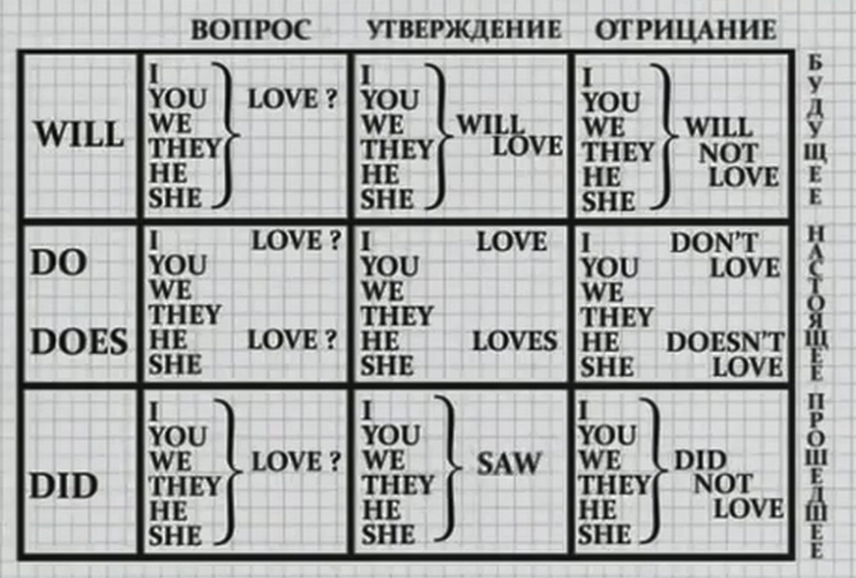
- In the table, the auxiliary verb in the interrogative sentence is somehow separated from the rest of the sentence;
- the pronoun it is absent at all (to give everything at once - so give everything at once!);
- the forms will not love and did not love are given in full, while the form don't/doesn't love is abbreviated;
- this craft looks especially ridiculous against the background of Petrov's promises that the old methods are done away with, henceforth - no boring school methods and memorization.
At the same time, such hack work is presented under the loud name of " volumetric structure ", which allows you to "see everything". And here, for comparison, is a fragment of the dilapidated, obsolete textbook A Grammar of the English Language by V. L. Kaushanskaya et al. (2nd edition, 1962):
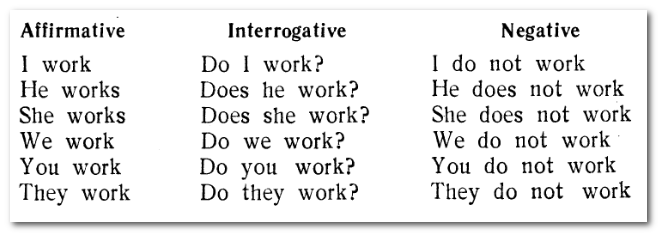
Similar tables are offered for each of the analyzed species-temporal forms. If innovativeness consists in taking what is already there and somehow inserting it into one table, then such “methods” are far from unique and innovative. I fully admit that Petrov did not even do this, but simply took a ready-made table from an old textbook and presented it with God's dew.
“ Learning the language… apart from the language!” One of the users of the above forum makes such a fair remark that it would be better to give the floor to her:
“The strangest and most absurd thing is that Petrov offers to study the language WITHOUT language material. Language apart from language. There is no English speech in English classes - they do not listen to it in dialogues, they do not read it in texts. The only source of linguistic material is a few words without context, read out by Petrov. They didn’t teach that even in the USSR, maybe before the revolution, maybe.”
All language material is offered by Petrov using a typical school grammar-translation method at its worst: students translate into English completely abstract sentences (against which Petrov demonstratively opposes) that they hear from the teacher; they don't read texts, they don't listen to anything, they don't watch anything. Indeed, it is now possible to surprise teachers of the most provincial schools with such narrow-minded methods, where new methodological developments are the last to reach.
Total: if you want to learn English - with "Polyglot" you are not on your way , because additional time will be spent on correcting Petrov's mistakes and correcting your knowledge . We haven’t mentioned this yet, how Petrov explains the presence of the auxiliary verb do in English (see the first lesson): it turns out that a native speaker of English (even an illiterate one) perceives this verb in the meaning of “do” (!), Therefore, for example, Do you love ( me)? - it's in the mind of an Englishman Do you make love (for me)? This stupidity makes Petrov's "method" related to the "method" of another charlatan - Alexander Dragunkin , who spoke a similar nonsense about this verb even before Dima.
Finally, in this section I give a link to a small analysis of the English version of "Polyglot" in the entry " Polyglot program with Dmitry Petrov: a fly in the ointment ". Additional critical material with an analysis of the German “Polyglot” can be found in the article “ Thoughts about the “Polyglot” by Dmitry Petrov, or “The Complete Catmaker” , in which Dima’s wish runs like a red thread: it’s worth stopping in time . It is a pity that he is not going to heed this advice, and with each new release of the TV show, trying to teach languages that he actually does not speak, he makes more and more numerous and gross linguistic and methodological mistakes.
Petrov's reaction to this article and attempts to justify himself
The fact that Petrov and his team read this article became clear, first of all, from their actions aimed at changing the wording of the uniqueness of the “method”, which were criticized in the material (see above about this): some of them were completely removed, and some have been substantially revised, which testifies to the absence of any firmly established and intelligible methodological basis of Petrov's "method".
However, the immediate reaction to this article, with its mention and attempts to direct the situation in a beneficial direction, came from Petrov and his Kazakhstani drinking buddy Boreyko as part of a series of commercials disguised as interviews released on the YouTube channel of the latter, timed to coincide with Petrov's traditional comb through Kazakhstan and invariably accompanied by calls to call, write and visit. In total, at the time of writing this section (April 5, 2020) on the Boreyko channel from December 19, 2019 to April 2, 2020, five videos with flashy selling titles were published (“ How to speak a foreign language in 4 days: POLYGLOT Petrov will teach"and so on.). The first fragment of the first video titled "False Methodist and Pseudo-Polyglot" begins briskly:
Boreiko adheres to the demagogic position formulated in the video in other public conversations, erroneously calling the effect of the article the Barbara Streisand effect :
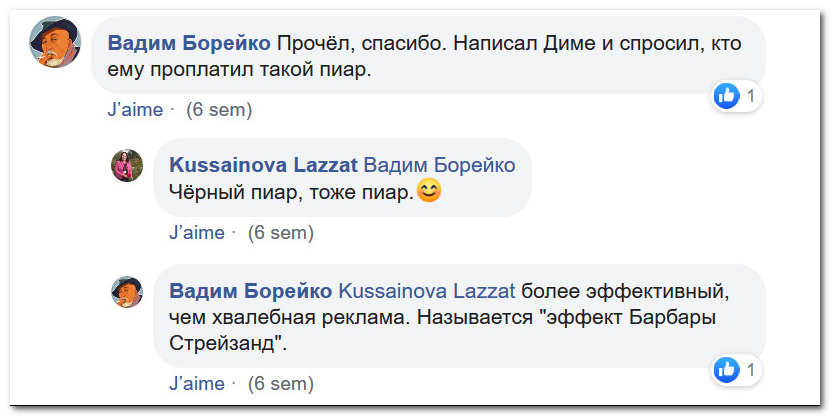
We explain to Boreiko that somehow the Streisand effect he mentioned is the result of an attempt to hide information, but not its systematized presentation with the involvement of sources that the “methodist” prefers not to remember.
Let's get back to the commercial interview. Immediately after mentioning the article, Boreiko, playing along with the “language evangelist”, asks a question containing the second manipulation:
The manipulation consists in the fact that the well-founded criticism of Petrov as an impostor who does not have the right to call himself a (psycho)linguist, polyglot and Methodist, set out in the previous sections, is replaced by a question, which at first glance is easy for Petrov:
“What person in their right mind and solid memory would believe, not knowing you, that you can introduce a person into a foreign foreign language in four days, sixteen lessons and make him speak?”
Naturally, Petrov categorically denies any involvement in this thought, attributing it to a "popular journalistic interpretation" and urging one to turn to primary sources. However, even with such a manipulative tactic, Petrov and his drinking buddy will fail: Petrov is lying, because he reports actually incorrect information . Let's use the advice about the source and open p. 11 of the aforementioned book by Petrov “Polyglot. 16 lessons":
“The aim of the course is to teach you how to speak English. […] … in order to learn to understand, to be understood and, most importantly, to get rid of the fear that hinders any desire to speak in the language for many, a few days are enough.”
What is it, if not "introduce into the language and force to speak"? In other words, Petrov has already agreed to indirectly call himself a charlatan.
total denial . Denial of the results of their own activities continues with a vengeance in one of the following commercials, where the following dialogue takes place between drinking buddies:
Boreiko : And “English in 16 hours” is called the “Polyglot” program ...
Petrov : Yes, but ... These are not my words. I am not the owner of this product. I am the guest host of this program. I don't even make decisions. And the books that are based on this television show, they do not belong to me. I have nothing to do with them, nor any rights.
Petrov continues to lie : his statement is actually incorrect, because it was he who was the author of the mentioned book, as well as other books in the series, his name and photo were placed on their covers, it was also indicated there that Petrov was their sole developer, it was he who In numerous interviews, he stated about a kind of “fireproof reserve”, which in 16 hours is supposedly formed among students. Moreover, he also came up with the concept of TV lessons. Denying his dubious heritage after so much time looks pathetic and of poor quality.
Hypocritical indifference to language levels: “That’s all appe intermediate , that’s all ...” In the last of the above video clips, Petrov also decided to deal a crushing blow to the Common European Criteria for Determining the Level of Foreign Language Proficiency (CEFR) and, in his characteristic peremptory manner, stated:
“And as for an independent… objective measurement of the level of knowledge, that doesn't exist. There are no objective ways. That’s all appe intermediate , that’s all ... A million of such systems that were mainly created to determine a person’s readiness to perform some tasks in some area. ”
Petrov's hostility to the CEFR scale, introduced by the Council of Europe in 2001 and previously developed in fact since 1971, is understandable: its application to his knowledge can significantly damage his reputation. Pronounced with a beautiful Russian accent, " appe intermediate " and "that's all" indicate Petrov's misunderstanding of the subject of discussion, hidden under a layer of neglect. In the course of the conversation, however, Petrov apparently recalls that it is better to fish in troubled waters, and slightly changes his testimony:
Boreyko : So you deny these levels?
Petrov : I'm absolutely... I'm absolutely... Well, I'm indifferent to them, let's put it this way.
This is another failure. We go to the official website of the Petrov school in the section " Exams " (highlighting in yellow is mine - D.P.):
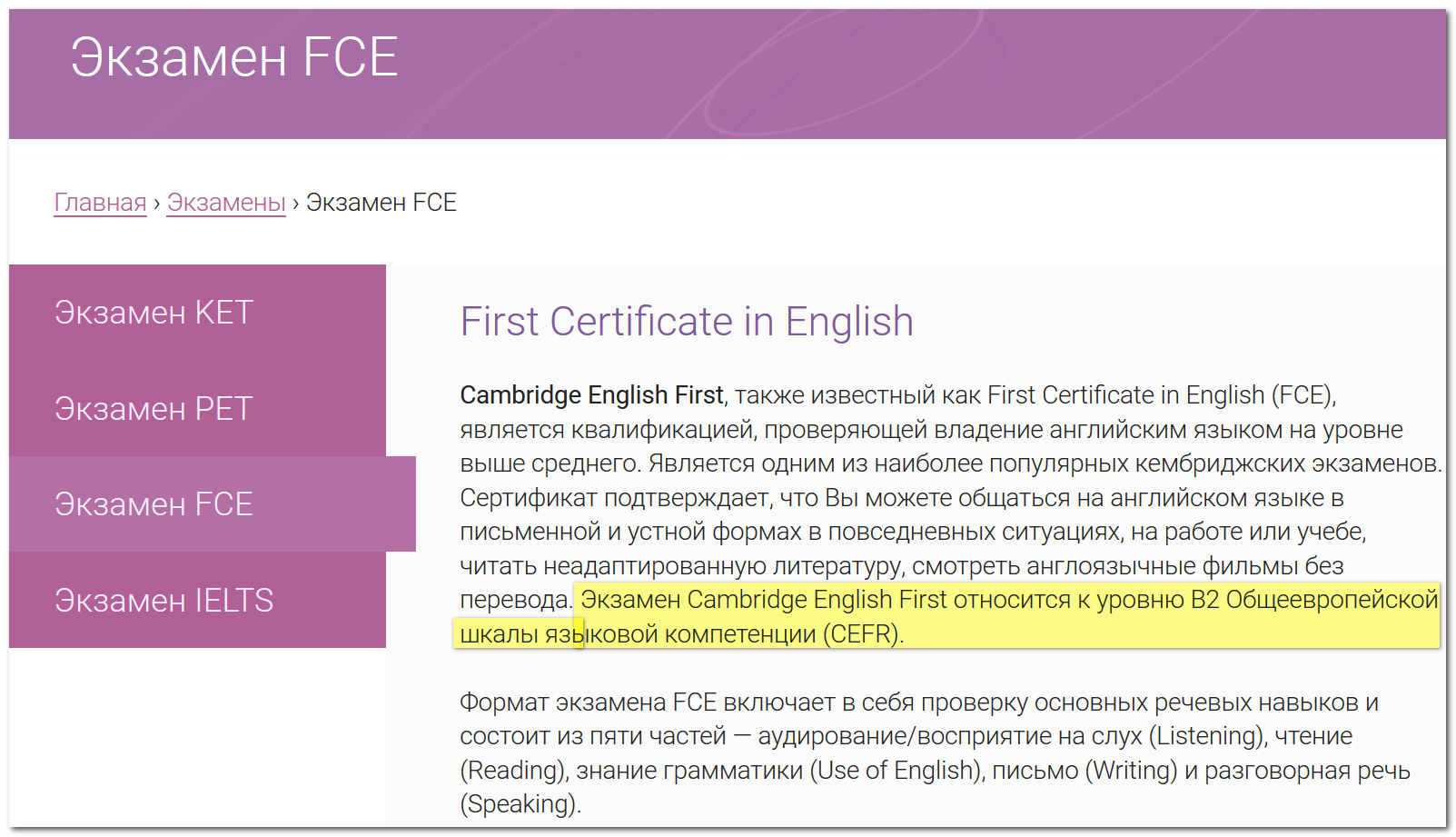
An optional explanation: either denying or indifferent to the language levels, Petrov in fact actively prepares students for passing international exams at CEFR levels , and all this happens at a school where teaching is carried out strictly according to Petrov's "method"!
Further in the conversation a minute before, Petrov, mercilessly criticizing “that's all”, tells how many levels (!) There are in his “method” (it turns out there are three of them; for comparison: in CEFR there are also three most common levels - beginner, advanced and free, but each of them is divided into further sublevels for greater accuracy, which makes it possible to quite objectively assess the student's language competence). In the final part of the conversation about levels, Petrov completely refutes the words with which he began:
Boreiko : What, is there really no system for measuring knowledge of the language at all?
Petrov : She is, but she is not alone, but there are many of them, and, secondly, there can be no ... stability in this system of measurements.
(Boreiko is clearly asking not about levels, but about adequate systems for testing knowledge.) In this short fragment, a winding path has been traveled: there is no system → there is one system → it is not one, there are many of them → there is no stability in (one) measurement system. What is the "stability of the measurement system" Petrov, I suppose, did not have time to come up with and in the near future we will not know about it. It remains to be hoped that Petrov's advertising screens in Kazakhstan and their advertising on the air of the Boreyko channel will give an answer to this question.
Petrov's answer to all the spiteful critics who refuse to believe in his polyglossia on the word . To discuss this important topic for Petrov, Boreyko chooses the most awkwardly posed question from the comments related to this topic:
Boreiko is clearly playing along with his drinking buddy, presenting the matter as if asking him to demonstrate communication skills in foreign languages means making people laugh. Petrov himself does not lag behind his friend and re-introduces the demagogic technique of “substitution of the thesis”:
“Recording a video just to show that I speak a language… Well, I think it's pointless, because I've been working as a simultaneous interpreter in five languages for thirty years, there are a thousand people who have seen and heard it. So I don't see the need for it."
Firstly , there are good reasons to assert that Petrov is once again lying about working as a simultaneous interpreter - at least in so many languages (what is his "working" Spanish worth!). Secondly , due to an unfortunate coincidence, among the thousands of people who “saw and heard” how Petrov simultaneously translated in five languages, there was no close friend of Yermolovich (see his testimony above), on the website page of which such words of himself are posted Petrov, said in 2012 on the anniversary of his friend:
“Dmitry Ivanovich [Yermolovich] is the person with whom we have actually known for 33 years, and only today I realized that, it turns out, such a time already connects us. And out of these 33 years, for about thirty years, Dmitry Ivanovich and I, who gradually became Dmitry for me, and then Dima, have been working in the field of simultaneous translation.”
Thirdly , Petrov pretends that the very test for polyglossia consists solely in voicing several phrases in each of the declared languages. This is also a lie : Petrov was repeatedly asked to demonstrate his communication skills in mastered languages. However, even without outside help, he knows how a test can be organized, because in 2017 he became one of the judges of the project “ Superpowers. Polyglots ”, in which the participants were given a number of communicative tasks:
Additionally, I cite the testimony of Zhuldyzai, a participant in this project from Kazakhstan, about her experience of interaction with Petrov:
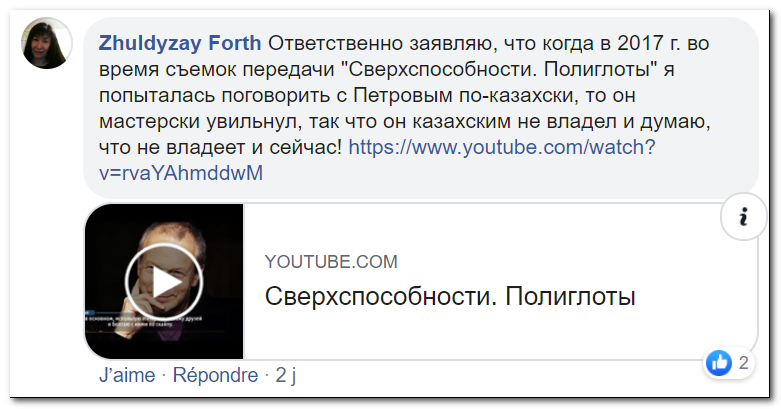
intermediate conclusion . Despite all attempts by Boreyko to conduct a conversation with Petrov in the most favored nation mode (convenient and leading questions, incessant advertising, etc.), the published conversations contain so many lies and manipulations that it should be a shame not so much for Petrov, for so many years to lie, accustomed to lying, how much to Boreyko himself, who:
- did not adequately prepare for the interview and therefore showed low journalistic qualifications, or
- deliberately, in collusion with the charlatan Petrov, he misled the viewers of his channel, which makes him an accomplice of deception.
The nature of Boreyko's actions gives me reason to lean towards the second version.
Conclusion
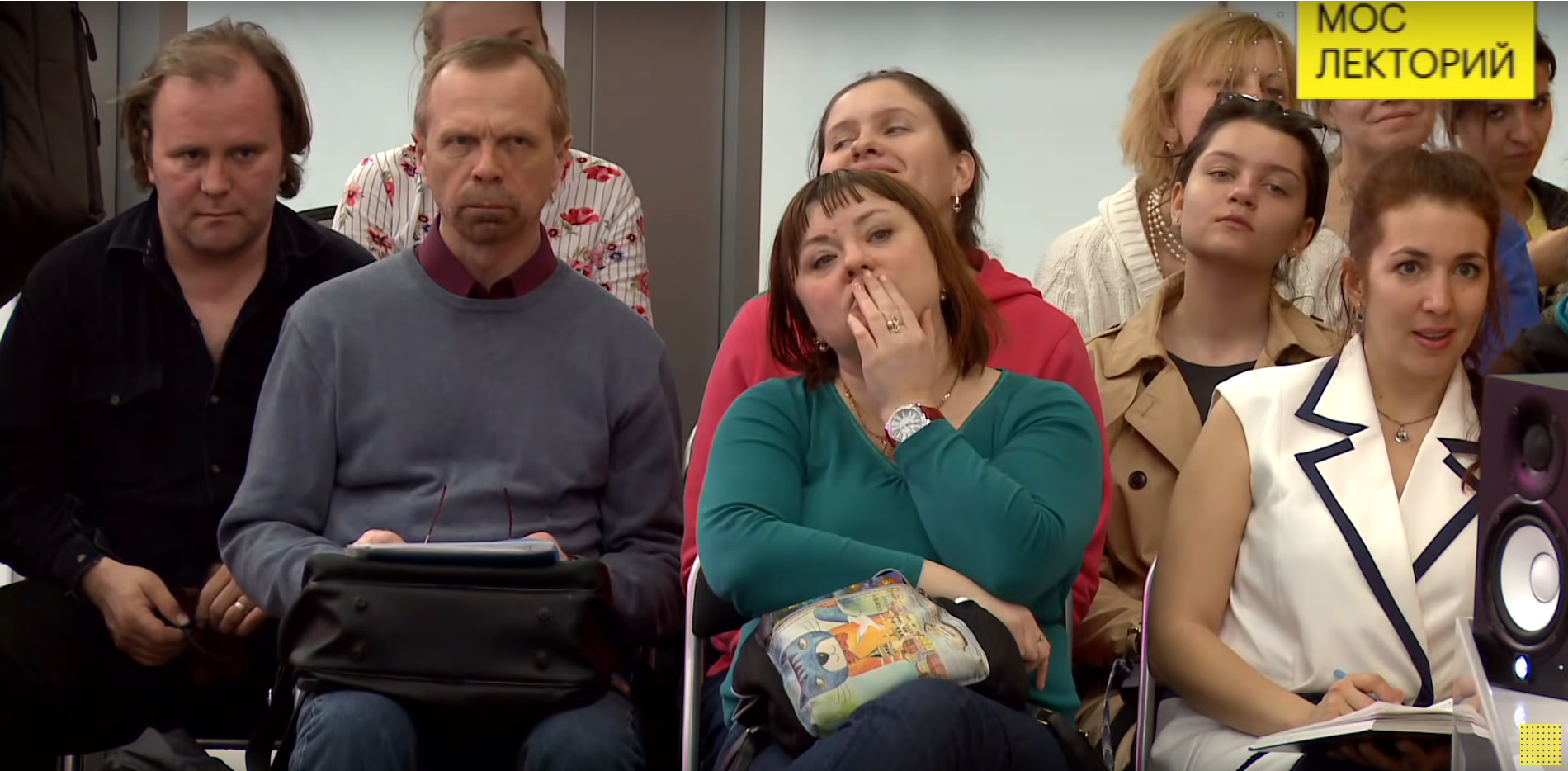
We examined three incarnations of Dmitry Petrov - psycholinguistic, polyglot and methodical. In the course of writing the article, I must admit that I could not even imagine that everything was so bad: a person who began his inglorious activity with dubious "mystical" meetings with hypnotic chants to the guitar, successfully transferred the experience of the beginning of his career to the all-Russian , and now - foreign Russian-language media and educational space (for example, in March 2019, our hero sat in the studio of the Estonian channel E-TV and cheerfully talked again and again about 50% psychology and 50% pure mathematics). A person who profanes everything he talks about and speaks outright pseudoscientific nonsense, which is refuted by the simplest test, getsstate support in Kazakhstan for teaching Kazakhstanis the Kazakh language, which they do not even speak, and in Russia - for teaching millions of people with morally obsolete, ineffective methods, languages that they speak poorly (as in the case of English), very superficially or actually do not speak at all ( like Chinese). A person capable of lying systematicallyabout 120/50/30/8 languages that he either speaks fluently, or simply “knows when necessary”, or “once knew”, but in fact he cannot even recognize by ear, becomes a model for many people who call for a Nobel Prize (in addition to the "record" that he appropriated to himself!), to make him Minister of Education or swear great love to him and, with their mouths open, heed his every word. If such a person - a liar and a charlatan, in whose actions signs of fraud are noticeable - becomes a moral authority, then something is clearly wrong in the conservatory (both folk and state).
PS The practice of writing such materials shows that their defendants, as well as people close to them, tend to promptly delete sources, links to which are given in the materials (see, for example, the situation around the discussion thread on the website of the translator Yermolovich, from which in a strange way left horns and legs). I inform those who like to delete what got on the Internet: absolutely everything mentioned here is recorded and saved (including some sites in full), so I warn you against wasting time and effort.
Credits:

